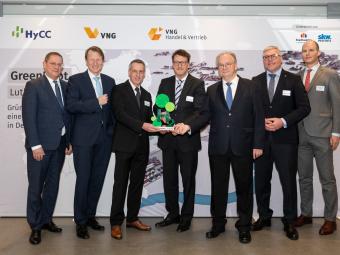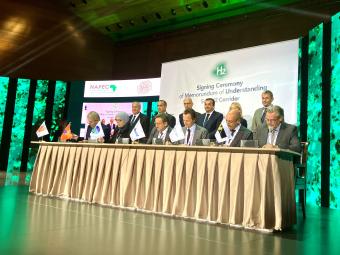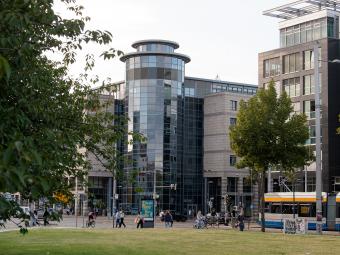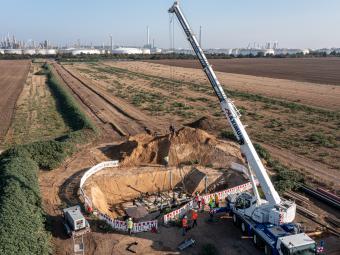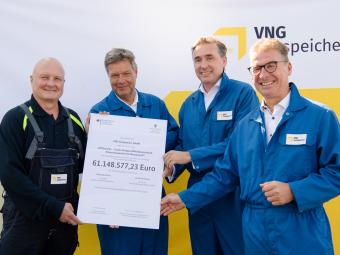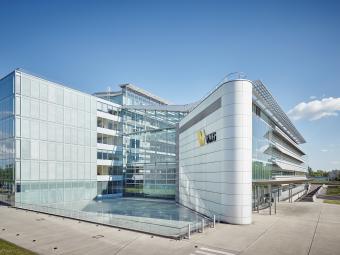Financial statements for 2022: Successful crisis management as the basis for a stable outlook
“We look back on a turbulent and extraordinarily challenging year 2022, which put VNG in an unprecedented business situation,” says Ulf Heitmüller, CEO of VNG AG, opening this year’s Annual Press Conference 2023 in Leipzig. “The Russian war of aggression was a turning point for the entire energy industry, including the VNG Group. 2022 has seen changes in established market mechanisms. At the same time, market activity was extremely volatile. Due to the loss of Russian gas supplies, the political, economic and social focus on the security of the gas supply never been greater. Nevertheless, we managed to replace Russian natural gas quickly and reliably – albeit at high cost,” says Heitmüller.
As a company in the gas industry that’s important to the entire system, VNG was confronted with major challenges in guaranteeing the security of supply, especially in the Trading & Sales business area, says Heitmüller: “Competitive market prices could no longer be assured. By substituting the Russian gas supplies that were no longer available, we had to bear extremely high costs to secure substitute sources so we could keep on reliably supplying our customers at the contractually agreed prices, which are significantly lower.”
VNG closed the 2022 financial year with an adjusted EBIT, i.e. the EBIT adjusted for extraordinary and one-off effects, of EUR -205 million (2021: EUR +225 million). With EUR -337 million, the consolidated operating result is also well below the previous year (2021: EUR 141 million). In the 2022 financial year, VNG achieved invoiced sales of EUR 36.2 billion (2021: EUR 18.5 billion). Sales doubled due to the extraordinarily high market prices for natural gas. The VNG Group employed a total of 1,578 persons as of 31 December 2022 (2021: 1,462). The increase is due to the first-time inclusion of GDMcom GmbH – a subsidiary of ONTRAS Gastransport GmbH (ONTRAS) – in the consolidated financial statements. Despite the major economic challenges, VNG invested EUR 128 million across all business areas last year. The investment focus was on infrastructure and green gas projects in order to consistently implement the “VNG 2030+” strategy.
“We have made it through this difficult year comparatively well. The additional financial strains incurred in securing substitute supplies massively drained the equity and ultimately left deep marks on our balance sheet. Nevertheless, in a joint effort we put the company back on a solid footing with three pillars. The first two pillars were the settlement agreement with a subsidiary of SEFE Securing Energy for Europe GmbH and the settlement reached with the federal government in connection with the costs incurred in securing substitute supplies for the direct supply contract with Gazprom. The third and ultimately decisive step was the equity increase by our shareholders. This enabled us to avert nationalisation of VNG. This stabilisation results to the support of the federal government, our shareholders, as well as the excellent operating performance. I want to say thanks for the tireless commitment of our employees,” summarises Bodo Rodestock, member of the Executive Board for Finance and Human Resources at VNG AG.
“Our overall negative group result and the losses in the business area Trading & Sales contrast with developments in the business areas Transport, Storage, Biogas and the newly established Digital Infrastructure, which are contributing positively to the consolidated result. VNG H&V performed exceptionally well despite the difficult market conditions and was able to avert much higher losses. Overall, this shows the strength of VNG’s broad stance,” says Rodestock. The subsidiary ONTRAS contributed a high double-digit million amount to the annual result. This means that the business area Transport continues to be a central pillar of the VNG Group.
As a result of the strongly fluctuating summer/winter spreads last year, the business area Storage consistently met to its cost targets in order to ensure long-term competitiveness. Despite a volatile market environment, VNG Gasspeicher GmbH achieved an adjusted EBIT in the mid double-digit million range from the operating business.
The past financial year was particularly challenging for the business area Trading & Sales, where VNG’s profit-driving major customer and trading business is. Gas sales have fallen due to a price-related reduction in demand by 23% to around 588 billion kilowatt hours (kWh) (2021: around 762 billion kWh). In 2022, the replacement procurement costs for failed Russian import volumes dominated the result, which meant that VNG Handel & Vertrieb GmbH (VNG H&V) had a negative effect on VNG’s overall result in the mid three-digit million range.
In 2022, BALANCE Erneuerbare Energien GmbH (BALANCE) consistently contributed to implementing the Group strategy “VNG 2030+” by successfully growing the biogas business area through a portfolio expansion. The total number of biogas facilities operated by BALANCE was expanded to 40 plants in Eastern and Northern Germany in 2022 and an installed rated thermal output of approx. 174 MW (MWFWL). This enables BALANCE to supply around 51,000 households with renewable electricity and 53,000 households with green gas every year. The Biogas division achieved an adjusted EBIT in the upper single-digit million range.
In the new fifth business area, VNG focuses on the expansion and operation of digital infrastructure. VNG invests directly and indirectly in the expansion of the fibre optic network and in the FTTX business via various holdings and subsidiaries, and maintains municipal cooperations in Central Germany. The adjusted EBIT of the business area Digital Infrastructure will be in the high single-digit million range in the 2022 financial year.
Accelerated transformation in the area of green gases
“VNG sees itself as an active shaper of the energy transition. The transformation of VNG towards green gases was accelerated even further,” says Hans-Joachim Polk, member of the Executive Board of Management for Infrastructure and Technology at VNG AG. “Natural gas, increasingly supplemented by biogas and hydrogen will remain essential for a secure and competitive energy supply for business and private households. In the biogas sector, we successfully laid the foundations for further growth last year, in addition to expanding the plant portfolio, through a strategic cooperation for the production and distribution of Bio-LNG with EnviTec Biogas AG. We were also able to gain momentum in our climate-friendly hydrogen projects. It is important to use the existing infrastructure such as LNG terminals, transmission and distribution networks or the storage infrastructure for the ramp-up of green gases. For example, ONTRAS is preparing for the transport of hydrogen. Core components with ONTRAS participation are, for example, the hydrogen start network in eastern Germany or the European H2 backbone,” Polk continues.
“We want to use our strong position in the gas market to accelerate the energy transition. To this end, we are investing in projects with renewable and decarbonised gases in eastern Germany,” says Polk. In addition to the flagship project Bad Lauchstädt Energy Park in the federal state of Saxony-Anhalt, in which the entire value chain of green hydrogen is to be modelled in a regulatory sandbox of the energy transition, VNG is involved in another consortium for the production of hydrogen from raw biogas. In a project funded by the Federal Ministry of Economics and Climate Protection, the construction of a corresponding test facility on the site of a BALANCE biogas plant in Gordemitz, Saxony, is planned in order to produce green hydrogen for local use in the transport sector.
“In addition to the considerable potential for hydrogen production in Eastern Germany, we have to think about the import infrastructure: Only through new international cooperation and additional imports of hydrogen and its derivatives can we meet the demand for a successful structural change. From our point of view, the Hanseatic city of Rostock, with its overseas port and an existing ammonia terminal, can act as a hub for international hydrogen imports to Eastern Germany,” explains Polk. Together with the Norwegian energy company Equinor, VNG is planning to produce hydrogen with low CO2emissions in Rostock. The project should contribute to local and regional value creation and cover 20% of the forecast hydrogen demand in eastern Germany in 2030. In addition, VNG is working with the French energy company Total Eren to set up a green hydrogen supply partnership with Chile. The aim is to transport green gas, i.e. renewable or decarbonised gas, to Rostock in the form of ammonia and distribute it as hydrogen in Eastern Germany. VNG is also cooperating with the Algerian energy company Sonatrach in the field of long-term hydrogen and ammonia projects in order to be able to import green hydrogen from Algeria to Germany in the future.
With a view to 2023, Heitmüller emphasises: “Even if we still need natural gas in the short and medium term, it is important to become CO2-neutral and that will happen much faster than expected. We see it as our responsibility to actively help shape an increasingly climate-neutral society and, as part of the gas industry, to make a contribution with gases to safely transforming our energy system. In particular, a rapid ramp-up of the hydrogen economy will contribute to security of supply. In the course of setting the right course in policy, such as legal certainty when investing in hydrogen infrastructure or openness to technology on the way to decarbonisation, VNG can successfully contribute its core competencies to the ramp-up of green gases: Trading & Sales, Transport and Storage. Important components of our overall commitment will continue to be value creation in Eastern Germany and the transformation of the regional energy supply in the future.”

VNG is a group of over 20 companies active in the European energy industry, employing about 1,700 people. As a gas importer and wholesaler as well as an operator of critical gas infrastructure, the Group, which is headquartered in Leipzig, is central to the secure supply of gas in Germany. With the “VNG 2030+” strategy, VNG is also pursuing an ambitious path for a market ramp-up of renewable and decarbonised gases such as biogas and hydrogen, paving the way for a sustainable, secure supply and, in the long term, climate-neutral energy system of the future.
press picture
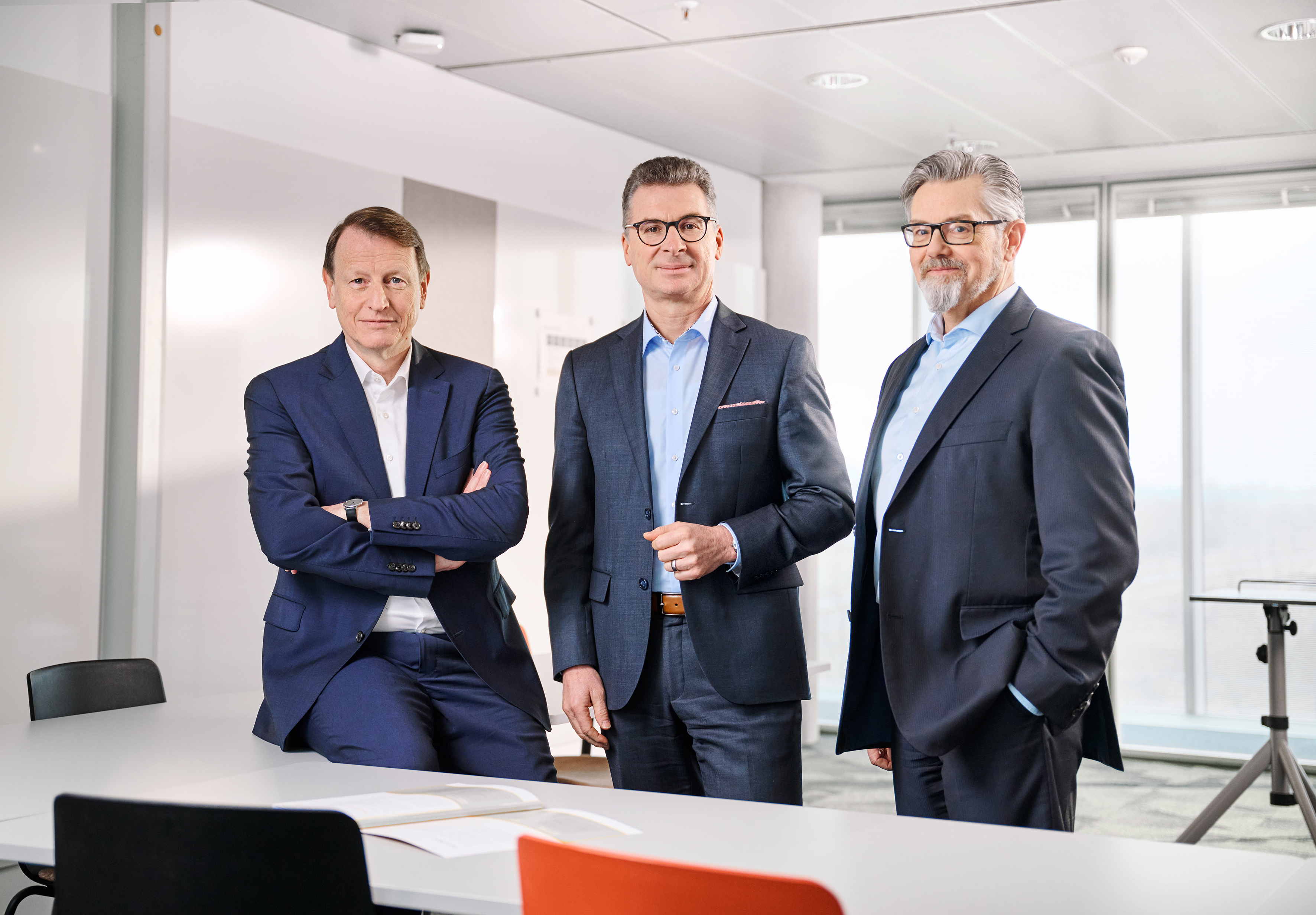
Board members of VNG AG: Ulf Heitmüller, Bodo Rodestock und Hans-Joachim Polk (f. l. t. r.) © Jeibmann Photographik/T. Pross
Financial information
Here you will find the current key financial figures for the financial year 2022.
